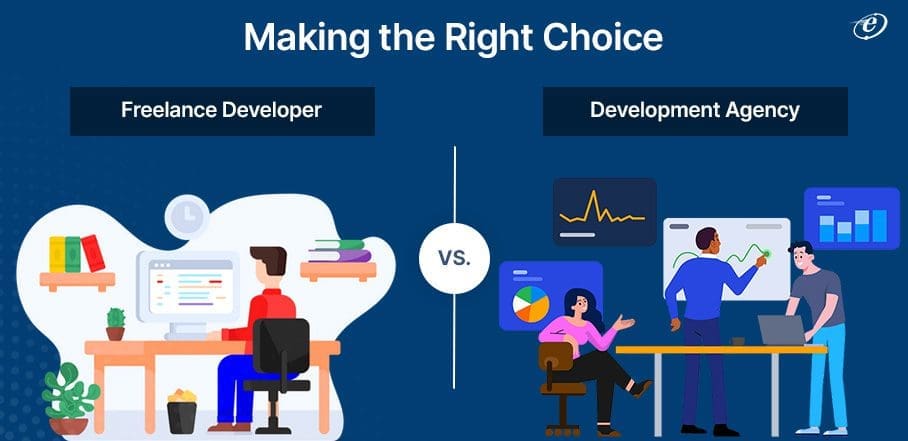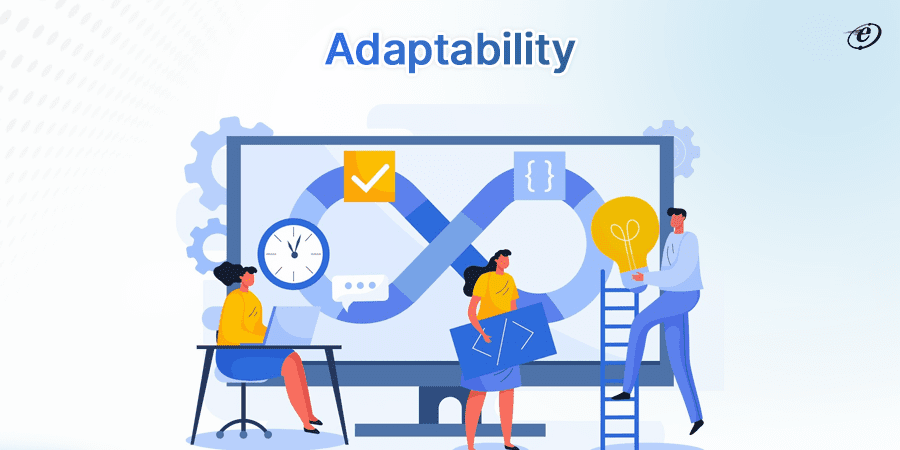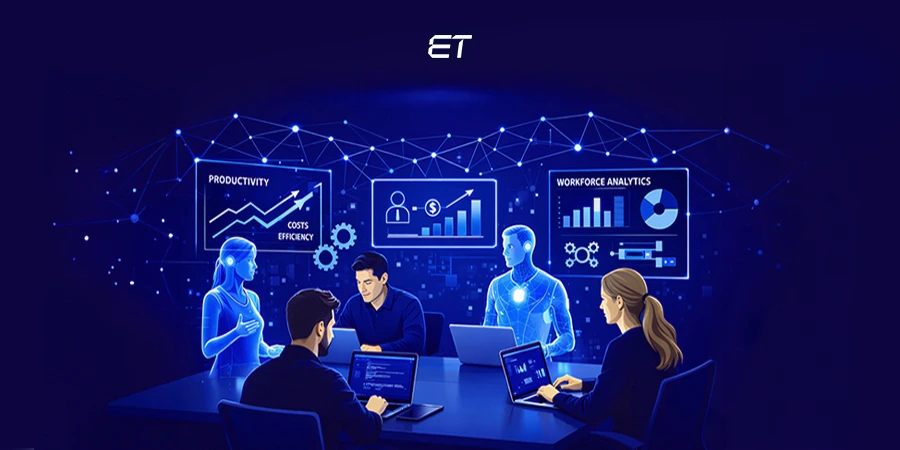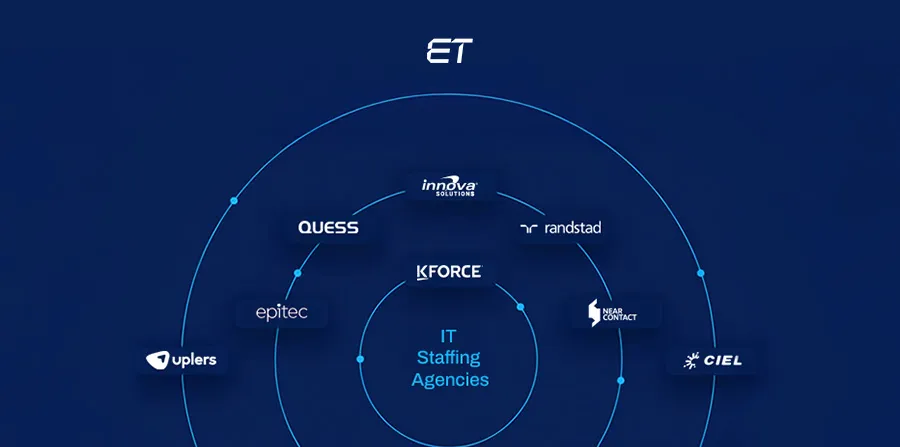
Should You Hire a Freelance Developer or Development Agency?
You have a brand new idea to launch a website or an app — the next step is contemplating the most popular choices – a freelance developer vs. development agency.
So, what do you choose?
Well, there is no ‘one-size-fits-all’ answer to this question. With several freelance developers for hire, you might think, ‘Ah, this is a more profitable association.’ However, once you understand positives like reliability, stability, and management, the decision can lean towards partnering with a development agency.
To solve this dilemma, you must understand both resources’ pros, cons, and working approaches. This blog lays down all such vital details in a straightforward manner.
Who is a Freelance Developer?

In simple terms, a freelance developer is a skilled programmer working solo on client projects. Here are the main attributes of freelance developers:
- Independent Work Style: These professionals do not work for a single company
- Versatility: Their skills range from website building and app development to software fixes and data analysis
- Self-employed Nature: Freelance developers handle everything themselves, from finding work and managing deadlines to marketing and invoicing
- Flexibility: A Freelance developer sets their own schedules and often work remotely
Overall, if you hire a freelance developer, here are some benefits that you can experience:
| Personalized services | Cost-effective development |
| More control over project scope | Less formal documentation |
Still, you should be considerate of some facets when working with a freelance developer as below:
| Define your requirements clearly | Draft a simple contract outline |
| Evaluate the portfolio in depth | Scan the LinkedIn profile |
What is a Development Agency?

As the name suggests, a development agency is a firm that has part-time or full-time developers working on different projects. The main characteristics of such an organization are as follows:
- Collaborative Expertise: A development agency boasts a diverse crew of programmers, designers, marketers, and project managers, each a specialist in their domain
- Scalability on Demand: You can expect any level of software development service ranging from a minor website bug fixing to the development of a detailed sales portal
- Streamlined Processes: Compared to freelance developers, IT agencies have more systematic workflows and project management systems
- Structured Communication: Development Agencies emphasize clear communication channels and have a dedicated point of contact
Here are some of the main advantages of partnering with a reliable development agency:
| Wide range of skilled resources | Fewer development challenges |
| Ready-made vetted team | High stability and reliability |
When collaborating with a development agency, here are four major considerations that you should address:
| Check the culture fit of the agency | Define budget upfront |
| Establish clear communication protocols | Evaluate their customer ratings |
Freelance Developer vs. Development Agency: Head-to-head Comparison

Comparing freelance developers with an established software development agency can help you make the right decision. Sometimes, you might receive high ROI after hiring a freelance developer.
However, a reliable development firm can be the best choice for some projects. In this section, you will receive straightforward insights.
1. Time for Development

When it comes to development projects, time is money. You want to see results quickly and efficiently. So, choosing between a freelance developer and a development agency can prove to be a crucial decision.
Freelance Developer
- Fast Start: Solo developers can often begin work quickly, eliminating the need for agency onboarding processes
- Direct Communication: Real-time communication with the developer simplifies decision-making and avoids delays due to miscommunication
- Flexibility: Freelance developers are more adaptable to changing requirements and can adjust schedules to accommodate urgent needs
Development Agency
- Parallel Processing: Multiple developers working on different aspects of the project can significantly reduce overall development time
- Established Processes: Streamlined workflows and project management systems avoid delays and ensure efficient execution
- Scalability: Agencies can quickly scale resources up or down to meet project demands, speeding up development during critical stages
Both options can seem useful at this stage, right?
Well, on the surface level, they sure do. But as a business, you should consider the following points to make the best decision:
| Parameter | Suitability |
| Small, well-defined projects | Freelance developer |
| Complex projects, tight deadlines | Development agency |
| Long-term software projects | Development agency |
2. Cost-effectiveness

As a decision-maker, cost-effectiveness is one of your prime considerations. So, understanding their unique financial landscapes becomes vital when choosing between a freelance developer and a development agency.
Freelance Developer
- Competitive Rates: Solopreneurs are often more affordable than agencies, especially for smaller projects or projects requiring specific skills
- No Agency Fees: You avoid additional overhead costs associated with agency management
- Pay for what you need: Flexibility to adjust hours or tasks, potentially optimizing cost based on project progress allows for a customized pricing model
Development Agency
- Predictable Pricing: Clear project quotes and established fee structures offer budgetary certainty
- All-inclusive Expertise: Access to a diverse team of specialists at a single cost eliminates the need for hiring multiple freelancers
- Scalability: Development agencies can adjust resources based on project needs, potentially avoiding unnecessary expenses
So, which choice is suitable under different circumstances? Refer to the following table:
| Parameter | Suitability |
| Tight budget, well-defined projects | Freelance developer |
| Complex projects, diverse expertise | Development agency |
| Ongoing software projects | Development agency |
3. Management Style

Management style is crucial in ensuring smooth sailing throughout the development process. So, understanding their distinct management approaches is critical whether you’re considering a freelance developer or a development agency.
Freelance Developer
- Direct Communication: Unmediated communication with the developer leads to clarity, flexibility, and quick decision-making
- Agile Adaptability: You can manage changes in project requirements due to the single point of contact
- Personalized Approach: Tailored workflows and communication styles cater to your specific needs and preferences
Development Agency
- Structured Processes: Established project management and software development methodologies to ensure clear communication, documentation, and task delegation
- Dedicated Project Manager: An experienced single point of contact within the agency oversees communication, progress updates, and risk mitigation
- Team Collaboration: Regular team meetings and communication channels promote transparency and alignment between stakeholders
So, which one of the two options should you prefer? Fret not; the following table will simplify your decision:
| Parameter | Suitability |
| Small, straightforward projects | Freelance developer |
| Complex projects | Development agency |
| Limitations of internal resources | Development agency |
4. Flexibility

On the surface level, you might feel that freelance developers offer more flexibility than agencies. Well, if this is the case, think again!
Consider the following valid points that can help you make the right decision.
Freelance Developer
- Agile Adjustments: A freelance developer can easily adapt to changes in project scope or requirements due to the single point of contact
- Open Communication: Direct conversations with the developer facilitate quick decision-making
- Personalization: Freelancers adapt workflows and communication styles to your specific needs and preferences
Development Agency
- Scalability: Agencies can quickly adjust resources up or down to accommodate changes in project requirements
- Specialized Expertise: Diverse skills within the team allow for tackling unforeseen challenges without significant interruptions
- Established Processes: Change management procedures ensure proper documentation, communication, and risk mitigation
So, what should you, as a business, choose? Refer to the following aspects:
| Parameter | Suitability |
| Dynamic projects | Freelance developer |
| Complex projects | Development agency |
| Overburdened team | Development agency |
5. Hiring Process

The hiring process for freelance developers or a development agency can differ depending on the circumstances. Understand the main aspects of both options to make an informed choice.
Freelance Developer
- Direct Interaction: You directly assess the developer’s skills and cultural fit through interviews and portfolio reviews
- Faster Onboarding: Minimal overhead for setup allows you to begin work quickly once you find the right person
- Cost-effectiveness: This option includes potentially lower initial costs compared to agency fees
Development Agency
- Pre-Vetted Talent: By partnering with a professional company, you gain access to a talented pool of vetted developers with diverse skills and proven experience
- Streamlined Process: Established agency processes make hiring efficient, with minimal disruption to your workflow
- Reduced Risk: IT vendors minimize the risk of hiring mismatches through their internal selection procedures
To sum up, consider the three scenarios below to choose the best fit for your software development project:
| Parameter | Suitability |
| Small, well-defined projects | Freelance developer |
| Complex projects | Development agency |
| Short-term tailor-made project support | Freelance developer |
Freelance Developers or Professional Agencies: A Simplified Look
By now, your choice for the next software development project must be clear. However, to have a simpler idea, refer to this table:
| Parameter | Freelance Developer | Development Agency |
| Cost | Generally more affordable, especially for smaller projects | Higher costs due to agency fees and overhead |
| Development Time | Can start quickly, but onboarding depends on individual capacity and number of existing projects | Initial formalities, but established processes and existence of dedicated developers can speed up the overall development time |
| Supoort | Unstable support for software development due to lack of dedicated resources | Robust and long-term service support due to an established process and presence of skilled personnel |
| Expertise | May require hiring multiple freelancers for diverse skill | Access to a team of specialists with varied expertise |
| Management Style | Direct communication with developer, personalized workflows | Structured processes, dedicated project manager, team collaboration |
| Hiring Process | Time-consuming to find and shortlist candidates | Streamlined process, access to pre-vetted talent pool |
| Ideal for | Very small, well-defined projects, specific skill needs, short-term needs | Mid level to complex projects requiring diverse expertise, ongoing or long-term projects, businesses with limited internal resources and requiring continuous support and maintenance |
Summing Up
Choosing between a freelance developer and a development agency for your software project is critical. Both options offer unique advantages and considerations.
A freelance developer might be your perfect match for small, well-defined projects with specific needs or short-term requirements. Their fast onboarding, direct communication, and personalized approach can offer great value and flexibility.
However, a development agency could be the more suitable option for complex projects demanding diverse expertise, tight deadlines, or ongoing support. Agencies provide structured processes, a dedicated project manager, and access to a pool of pre-vetted talent, ensuring stability, scalability, and efficient risk management.
No matter your choice, thorough research and clear communication are essential. Take your time to assess your project needs, define your budget, and understand the strengths and weaknesses of each option. If you require a development agency to work on your project, contact us, and we will ensure top-notch services from start to end!





